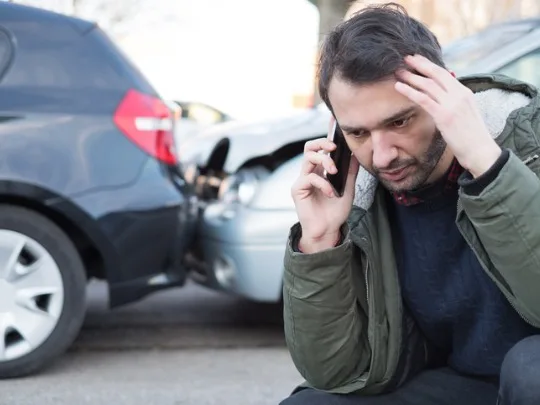Getting into a car accident is stressful enough, but when you know or even suspect it was your fault, the worry hits differently. You might be wondering if hiring a lawyer even makes sense here in Florida, especially if it feels like the blame is obvious. In this article, we break down exactly how to deal with a car accident that was your fault, and when, why, and how getting a lawyer can still help protect you after an at-fault accident.
Should I Get a Lawyer for a Car Accident That Was My Fault in Florida?
Short answer? Yes, you should at least talk to a lawyer, even if the accident was your fault. Florida’s no-fault laws don’t always shield you from legal or financial headaches, especially if someone else was seriously hurt or property damage goes beyond your insurance coverage. An auto accident attorney can help protect your rights, deal with insurance companies, and make sure one mistake doesn’t turn into a mountain of out-of-pocket costs or a lawsuit you didn’t see coming.
Even when the fault seems clear, the legal system in Florida isn’t always as straightforward as it sounds, which is why it helps to know how the state’s no-fault rules work.
Florida’s No-Fault System And What It Means When You’re At Fault
Florida is a no-fault state, but that doesn’t mean fault never matters or that you’re automatically protected if you caused the crash. No-fault simply means your own car insurance, specifically your Personal Injury Protection (PIP), pays for your medical bills and certain lost wages, no matter who caused the accident. But PIP only goes so far. It typically covers up to $10,000, and it doesn’t pay for damage to other people’s property or cover serious injuries beyond that limit.
If someone else involved in the accident suffered permanent injuries, significant scarring, or even worse, they can step outside the no-fault system and file a claim against you personally. That’s where things can get complicated and costly. Your Bodily Injury Liability coverage kicks in to help, but Florida doesn’t require drivers to carry BIL by law, so many people only have the bare minimum or none at all. If you do have BIL, typical policies start at $10,000 per person and $20,000 per accident, though higher limits are recommended. Your Property Damage Liability coverage, which is required, covers damage to someone else’s car or property, with a legal minimum of $10,000, but again, serious accidents can easily exceed that. If the damages go beyond your policy limits, your personal assets, wages, or savings could be at risk.
And let’s not forget about uninsured or underinsured drivers. If the other person doesn’t have any coverage and blames you, or even partially blames you, the situation can spiral fast. That’s why even in a no-fault state like Florida, having legal help on your side makes a real difference, especially when you’re dealing with a car accident that was your fault. However, there are a few helpful tips to keep in mind in case you ever face an at-fault accident, so you know how to react.
What Happens If You Caused (or Think You Caused) the Accident?
First things first—don’t panic. Even if you know or suspect you were at fault, leaving the scene or saying the wrong thing can make a bad situation worse. Keep calm and in case of such a situation, keep in mind what to do, step by step:
- Stay at the scene and check for injuries
- Call 911 and report the accident
- Exchange contact and insurance information
- Take photos and videos of the vehicles, the scene, and any visible injuries
- Avoid admitting fault or apologizing
- Get medical attention, even for minor aches or stiffness
- Notify your insurance company, but don’t overshare
- Talk to a car accident lawyer before making big decisions or recorded statements.
Of course, it’s better not to get into an accident at all, but knowing how these situations can play out and what steps you can take afterward can make a huge difference if you ever need to push back in an at-fault accident.
When Can You Push Back After an At-Fault Accident?
Causing a car accident, or thinking you did, doesn’t mean you automatically take the blame for everything. Florida’s laws leave room to challenge fault, share responsibility, and limit how much of the fallout lands on you, and it all depends on a few key factors:
Florida’s Modified Comparative Negligence Rule
Blame isn’t all-or-nothing. If you’re found 50% or less at fault, you might still recover some damages if you were injured, and it limits how much the other side can demand from you. If you’re over 50% at fault, you could be responsible for the bulk of the costs, but even then, how fault is calculated matters.
When Fault Isn’t Always Clear
Accidents happen fast. Maybe you rear-ended someone, but they were distracted, or their brake lights didn’t work. Maybe poor signage or road conditions played a role. A lot of cases aren’t as straightforward as they seem.
Do Police Reports Decide Fault?
Not entirely. Police reports help document the scene, but they don’t control what insurance companies, lawyers, or courts decide. They’re just one piece of the puzzle.
Why Legal Help Matters When You’re at Fault
It’s easy to assume that if you caused a crash, your insurance will handle it, and that’s the end of the story. But the reality? Things get complicated fast, especially if the other side decides to push back (and they often do), injuries surface later, or property damage costs more than your policy covers.
Here’s how having a defense lawyer on your side can make a real difference:
- Limiting Excessive Liability
You made a mistake, but that doesn’t mean you should pay more than what’s fair under Florida law. A lawyer helps prevent that. - Spotting Gaps in Your Insurance Coverage
Your policy has limits. If repairs or medical bills go beyond that, the other party could come after you personally. An attorney helps protect your assets. - Handling Insurance Adjusters
Insurance companies ask tricky questions to lower your compensation. The wrong answer can hurt your case. A lawyer coaches you through those conversations. - Preparing for Hidden Medical Costs
Injuries can surface days after a crash, for you or the other driver. Legal help keeps you ready for those surprises. - When the Other Side Threatens to Sue
And it happens more often than you think. A lawyer steps in early to protect your rights and lower your risk.
Even when you’re at fault, you’re not powerless; you still have options to work toward a smoother car accident settlement. Let’s break down what a defense attorney does during the investigation process and how that can end up saving you money.
What a Lawyer Does for an At-Fault Car Accident
When you hire the right car accident lawyer, it’s not just about showing up in court. It’s about preventing a lot of unnecessary problems and taking the pressure off you the moment things get complicated. Here’s what they do:
- Case Review & Fault Investigation
A lawyer digs into the details, including photos, damage reports, and witness statements, to see if your liability can be reduced. - Dealing Directly with Insurance Companies
They handle the back-and-forth with both your insurer and the other driver’s, so you don’t get boxed into an unfair deal. - Reducing Out-of-Pocket Costs
Legal help keeps you from paying for damages, injuries, or legal fees that go beyond your coverage. - Watching Your Back During Settlement Talks
Once you accept a settlement, you can’t undo it. A defence lawyer protects you from bad offers that leave you stuck with future bills. - Representing You in Court if Needed
If the case escalates to court, your lawyer builds your defense, fights to limit your exposure, and protects your rights every step of the way. - Making the Fine Print Simple
They help you understand your insurance policy, your legal risks, and your options, so you’re not left guessing.
The right legal team helps protect your future, your finances, and your peace of mind. However, to be fair, there are situations where you might not need a lawyer, even if you caused the accident.
When You Might Not Need a Lawyer
The truth is, not every car accident turns into a legal headache. In some situations, you may not need to hire a lawyer, and that’s perfectly okay. But be careful, as these situations are rather the exception, not the rule, when:
- Very Minor Fender Bender, No Injuries, Both Parties Agree
If it’s a small bump in a parking lot or a low-speed tap at a stoplight with no visible damage or injuries, and both drivers calmly agree on what happened, this might be one of the rare times when legal help isn’t necessary. You can swap insurance info, file a claim if needed, and move on. - Damage Clearly Below Insurance Policy Limits
If the property damage is small and obviously within the coverage limits of your insurance policy, the claim can often be settled quickly without legal back-and-forth. This applies when repairs are minor, there are no medical bills, and everyone’s being reasonable. - You Fully Understand Your Rights and Policy (Rare)
Most people don’t know the fine print of their insurance policies, but if you do, and you’re confident there’s enough coverage to handle the situation, you might not need a lawyer. Just be sure you’re not making assumptions, because once you settle, you can’t go back and change your mind. - No Threat of a Lawsuit, No Complicated Circumstances
If the other party isn’t blaming you, threatening legal action, or filing additional claims, and there’s no dispute about what happened, the odds of needing a lawyer are lower.
That being said, even in these cases, it never hurts to at least talk to a lawyer for peace of mind. Most offer free consultations, so you can get quick advice before deciding how to handle the situation. It’s always better to ask than to assume, especially with so many misconceptions out there about at-fault crashes.
Misconceptions About At-Fault Accidents
Plenty of people walk away from an accident they caused with the wrong idea about what happens next. It’s easy to assume you’re stuck, that you’ve got no options, or that your insurance will magically take care of everything. But that mindset can leave you wide open to bigger problems down the road. Let’s look at some of the common misconceptions and how they can end up:
- “I admitted fault at the scene, so there’s nothing I can do”
Not true. What you say at the scene might feel like an admission, but it doesn’t automatically decide legal fault. Florida law looks at the facts, not emotions, and your lawyer can still help reduce your liability or uncover details that shift blame, even after the fact. - “Since Florida is a no-fault state, I don’t have to worry about being blamed”
That’s only half the story. As we’ve explained above, no-fault insurance (PIP) covers medical bills and lost wages up to a point, but it doesn’t protect you from being sued for property damage, serious injuries, or costs that go beyond your policy. Fault still matters, and it can hit your wallet hard if you’re not prepared. - “My insurance company will handle everything for me”
Your insurance company handles claims, but its priority is protecting its own money, not necessarily yours. They might settle quickly to avoid a fight, even if it means more blame (and costs) land on you. Having your lawyer level the playing field. - “If it was just a minor accident, it’s not worth getting a lawyer”
Small accidents turn into big headaches more often than people think. Injuries can pop up days later, repair costs can exceed expectations, and the other driver can change their story. It’s better to be prepared than blindsided.
When it comes to at-fault accidents, what you think you know can cost you. That’s why getting legal advice upfront can save you a lot of stress and money later. But let’s say you ignore that advice and try to handle the whole process without an at-fault lawyer; here’s how that could turn out for you.
How an At-Fault Case Might Go Without a Defence Lawyer
Trying to handle an at-fault accident on your own can feel manageable at first, but it rarely stays that way. What starts as a few phone calls and paperwork can quickly snowball into something you didn’t see coming. Without a lawyer in your corner, here’s what often happens:
- You end up saying the wrong thing to an insurance adjuster, and it gets used to justify sticking more of the blame on you.
- The other driver’s injuries suddenly seem worse than they did at the scene—and now you’re looking at a claim that goes beyond your coverage limits.
- Your insurance company settles fast to save itself money, even if that leaves you exposed to future legal action or personal financial risk.
- You miss important deadlines or don’t push back when fault is disputed, and suddenly you’re paying for damages that could’ve been reduced or avoided.
- If a lawsuit lands on your doorstep, you’re scrambling to find legal help after things have already gone sideways.
It’s easy to think handling it alone saves time or money, but in reality, it often costs more in the long run. A lawyer makes sure you don’t walk into this process blind and that you don’t walk into it alone. Lastly, even if you decide to hire an attorney, it’s just as important to find the right professional for cases like yours.
How to Choose the Right Car Accident Lawyer for an At-Fault Accident
If you’re dealing with the stress of a car accident you caused—or think you caused—you don’t just need any lawyer. You need the right one. The kind of lawyer who knows how to handle tough at-fault cases, understands Florida’s laws inside and out, and actually puts your best interests first. When seeking a lawyer, look for the next experience:
- Experience with Florida At-Fault Accident Defense
Look for a lawyer who knows how to handle these cases in Florida specifically. They’ve seen how fault gets assigned, how insurance companies play their games, and how to protect clients in your exact situation. - Track Record in Negotiating Tough Cases
Talk is cheap, but results matter. You want a lawyer with a history of reducing liability for at-fault drivers, negotiating fair settlements, and keeping clients out of court when possible. Ask them straight up: “Have you handled cases like mine, and how did they turn out?” - Communication Style That Keeps You Informed
The last thing you need is to hire a lawyer and never hear from them again. The right attorney keeps you in the loop, explains your options in plain English, and answers your questions without making you feel rushed or brushed off. - Positive Reviews and Client Testimonials
What do past clients say? Reviews and testimonials can tell you a lot about how a lawyer treats people, especially in stressful situations like yours. Look for feedback from folks who were in similar positions and walked away feeling protected and respected.
Choosing the right lawyer isn’t just about legal experience; it’s about finding someone who understands what’s at stake for you and shows up to fight for it.
If you’ve been in a car accident that was your fault—or might have been—our experienced at-fault car accident lawyers at Steinger, Greene & Feiner are ready to help. With offices in West Palm Beach, Miami, Fort Lauderdale, Tampa, Fort Myers, Orlando, Port St. Lucie, and throughout Florida, we’ve handled countless at-fault cases, protecting our clients from excessive blame, unexpected costs, and legal headaches. Let us fight to protect your rights and guide you through the process. It starts with a free, no-obligation case review.





